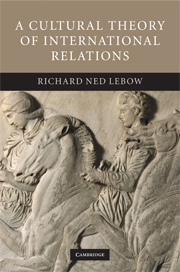Book contents
- Frontmatter
- Contents
- List of figures and tables
- Acknowledgments
- 1 Introduction
- 2 Fear, interest and honor
- 3 The spirit and its expression
- 4 The ancient world
- 5 Medieval Europe
- 6 From Sun King to Revolution
- 7 Imperialism and World War I
- 8 World War II
- 9 Hitler to Bush and beyond
- 10 General findings and conclusions
- Bibliography
- Index
3 - The spirit and its expression
Published online by Cambridge University Press: 03 July 2009
- Frontmatter
- Contents
- List of figures and tables
- Acknowledgments
- 1 Introduction
- 2 Fear, interest and honor
- 3 The spirit and its expression
- 4 The ancient world
- 5 Medieval Europe
- 6 From Sun King to Revolution
- 7 Imperialism and World War I
- 8 World War II
- 9 Hitler to Bush and beyond
- 10 General findings and conclusions
- Bibliography
- Index
Summary
Rage – sing, goddess, the rage of Achilles, the son of Peleus, the destructive rage that brought countless griefs upon the Achaeans.
HomerThis chapter develops a paradigm of politics based on the spirit and the need for self-esteem to which it gives rise. Following Plato and Aristotle, I contend this need is universal and distinct from appetite. The spirit is an individual drive but has great importance for politics because people seek self-esteem not only through their personal activities, but vicariously through the achievements of social units to which they feel attached, such as sports teams and nations. In classical Greece, citizens achieved standing and self-esteem individually and collectively through the triumphs of their city states. In the modern era, often called the age of nationalism, people achieve self-esteem in a variety of ways and many bask in the glory of their nations. Harold Lasswell and Hans Morgenthau, among others, argue that nationalism involves a degree of transference by individuals of their aspirations on to states. More recent research suggests that this relationship works in both directions. To build identities and mobilize public support, states construct and project characters and narratives of themselves to which many of their citizens become deeply attached. Policy-makers find it in their interests to act – or give the appearance of acting – in terms of these characters and narratives, which can restrain their freedom of action and at times compel them to pursue policies at odds with their preferences.
- Type
- Chapter
- Information
- A Cultural Theory of International Relations , pp. 122 - 164Publisher: Cambridge University PressPrint publication year: 2008



